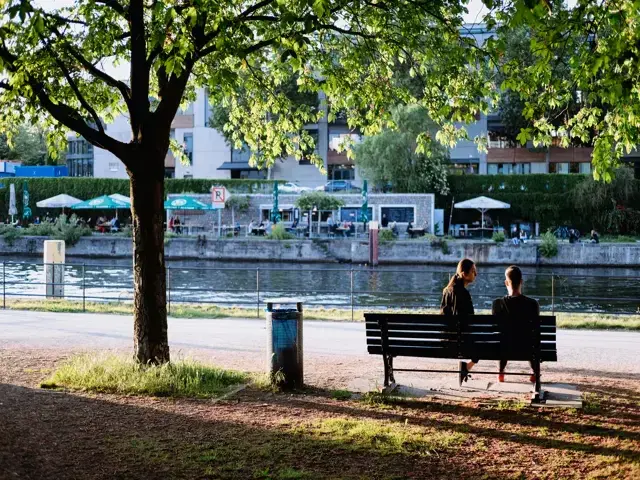
October 16, 2024
A guide to renting an apartment in Schöneberg
Schöneberg, a charming district in Berlin, offers a vibrant urban living experience for those seeking to rent an apartment. With its diverse neighborhoods and rich cultural heritage, Schöneberg attracts residents from all walks of life. Renting an apartment in Schöneberg provides access to excellent public transportation, green spaces, and a bustling local scene.
The area boasts a mix of pre-war buildings and modern developments, catering to various preferences and budgets. From cozy studios to spacious family flats, Schöneberg's rental market encompasses a wide range of options. Prospective tenants can explore apartments near popular spots like Nollendorfplatz or quieter residential streets, depending on their lifestyle needs.
Navigating the rental process in Schöneberg requires some preparation and knowledge of the local market. Interested individuals can benefit from researching average rental prices, understanding tenant rights, and familiarizing themselves with common requirements for rental applications. With proper planning and persistence, finding a suitable apartment in this desirable Berlin district is achievable.
Overview of Schöneberg rental market
Schöneberg's rental market offers diverse housing options at varying price points. The neighborhood's popularity among young professionals and families influences apartment availability and costs.
Average rent prices
Rent prices in Schöneberg vary based on location, apartment size, and amenities. As of October 2024, the average rent for a 1-bedroom apartment ranges from €800 to €1,200 per month. 2-bedroom units typically cost between €1,200 and €1,800 monthly.
Prices tend to be higher near popular areas like Nollendorfplatz and Akazienstraße. More affordable options can be found in quieter residential streets. Utilities often add an extra €100-€200 to monthly costs.
Rental prices have increased by approximately 5% annually over the past three years. This trend reflects Berlin's overall rising housing costs.
Popular apartment types
Schöneberg features a mix of pre-war buildings and modern developments. Altbau apartments, with high ceilings and ornate details, are highly sought after. These typically date from the late 19th to early 20th century.
Modern apartments, often found in post-war buildings or new constructions, offer updated amenities. Many include built-in kitchens and balconies.
Studio apartments are common, catering to single professionals and students. Families often opt for 2-3 bedroom units, which are less abundant but still available.
Shared apartments, known as WGs (Wohngemeinschaften), are popular among younger renters. These offer more affordable living options in desirable locations.
How to search for rental apartments
Finding the perfect rental apartment in Schöneberg requires a strategic approach. Several methods can help streamline your search and increase your chances of success.
Online platforms and listings
Popular platforms offer a variety of rental listings in Schöneberg, and using a service like Waitly can greatly simplify the process. With Waitly, you can join lists for apartments and receive notifications as soon as new rentals that match your criteria—such as price, size, and location—become available. This helps streamline your search and ensures you're informed of new opportunities quickly, saving you time and effort in a competitive rental market like Schöneberg.
Social media platforms like Facebook groups dedicated to Berlin housing can also be valuable resources. Members often post about available rentals or sublets in Schöneberg.
Local real estate agencies
Real estate agencies in Schöneberg can provide personalized assistance in your apartment search. These professionals have in-depth knowledge of the local market and access to listings not always publicly advertised.
Agencies like Engel & Völkers and Von Poll Immobilien have offices in the area. They can guide you through the rental process and potentially arrange viewings for suitable properties.
It's important to note that agency fees may apply. Clarify any potential costs before engaging their services. Some agencies specialize in specific types of properties or price ranges, so research to find one that aligns with your needs.
Understanding the Anzeigen codes
Rental listings in Germany often use abbreviations to convey information efficiently. Familiarizing yourself with these codes can help you quickly assess if an apartment meets your requirements.
Common abbreviations include:
KM: Kaltmiete (base rent without utilities)
NK: Nebenkosten (additional costs)
ZKB: Zimmer, Küche, Bad (rooms, kitchen, bathroom)
Example: "3 ZKB, 70m², 1000€ KM + 200€ NK" indicates a 3-room apartment with kitchen and bathroom, 70 square meters, costing €1000 base rent plus €200 for utilities.
Understanding these codes allows for faster evaluation of listings and more efficient apartment hunting in Schöneberg.
Moving and settling in
Relocating to Schöneberg involves essential steps for a smooth transition. Proper registration and setting up utilities are crucial for comfortable living in your new apartment.
Registration requirements
New residents in Schöneberg must register their address within 14 days of moving. This process, known as Anmeldung, takes place at the local Bürgeramt. Required documents include a valid ID, passport, and the Wohnungsgeberbestätigung (confirmation from the landlord). It's advisable to book an appointment online to avoid long wait times.
Registration is necessary for various aspects of daily life, such as opening a bank account or obtaining health insurance. Non-EU citizens may need additional documents, like residence permits. After registration, residents receive a confirmation letter, which is crucial for further administrative tasks.
Utilities and services setup
Setting up utilities in Schöneberg typically involves electricity, gas, internet, and phone services. Electricity providers can be chosen freely, with options like Vattenfall or E.ON available. Many apartments use natural gas for heating and cooking, which may be included in the rent or require a separate contract.
For internet and phone services, popular providers include Telekom, Vodafone, and O2. Comparison websites can help find the best deals. Water is usually managed by the landlord and included in the additional costs (Nebenkosten).
It's important to arrange these services before moving in to ensure a comfortable start. Some utilities may take a few days to activate, so planning ahead is key.